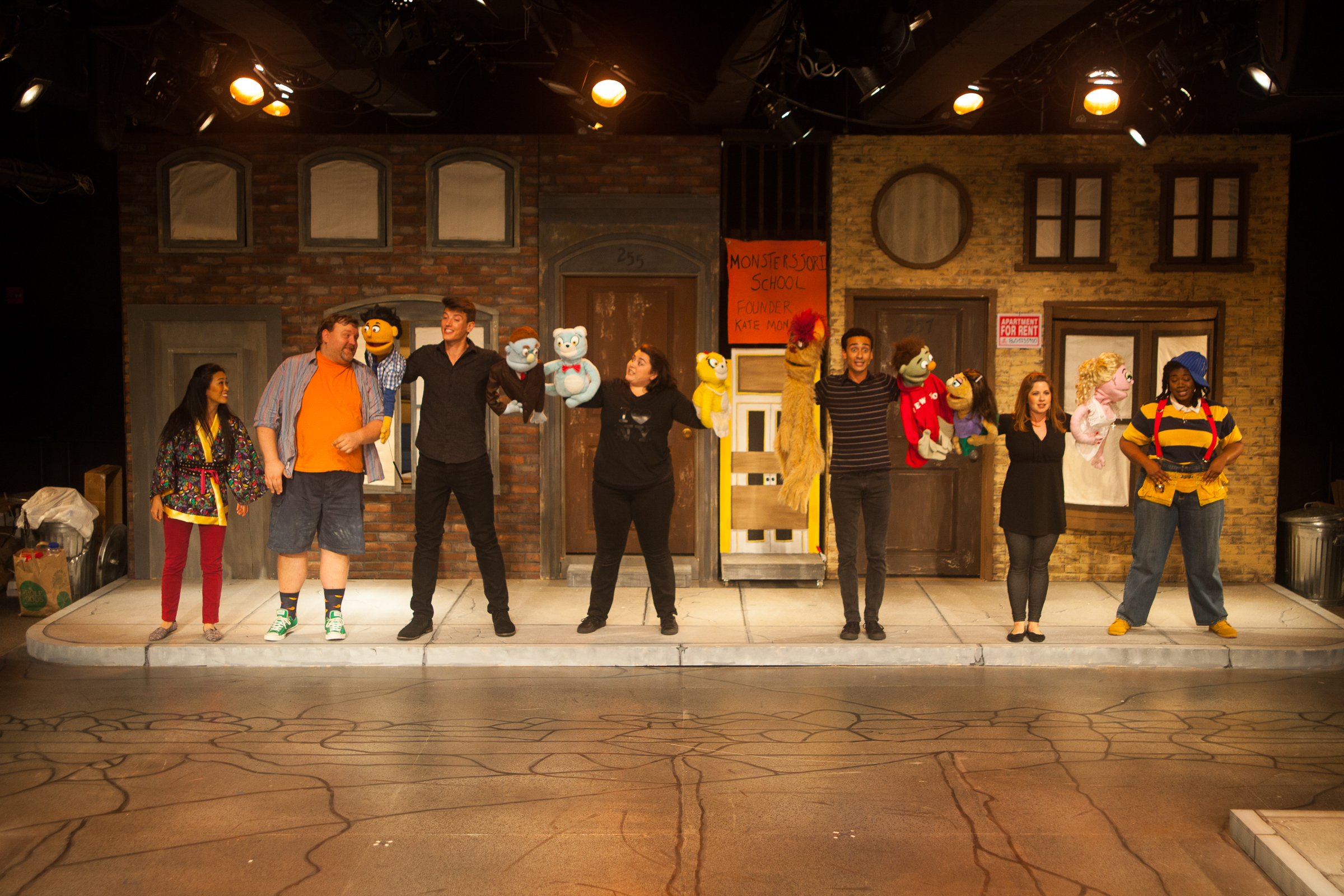Review of The Book of Mormon, The Palace Theater, Waterbury
Seeing The Book of Mormon, the irreverent and gleefully foul-mouthed Tony-winning musical by Trey Parker, Robert Lopez and Matt Stone in a touring production now at the Palace Theater in Waterbury through April 14, is like going to a party—either a party where you know everyone and have fun, or a party where you don’t, and don’t.
Trey Parker, Robert Lopez and Matt Stone’s much-praised The Book of Mormon, at the Palace Theater in Waterbury through April 14
If you do have fun, it’s as at the expense of goofy Mormons and their made-in-the-U.S.A. myth; cartoonish Ugandans, suffering from poverty, AIDS, and a warlord who wants to circumcise all women; a range of references to Disney and Star Wars, Star Trek, and Lord of the Rings; a big seduction moment that features a baptism; a big production number set in a “Spooky Mormon Hell Dream” that includes simulated sex with heinous inmates like Adolf Hitler and Jeffrey Dahmer; and a lengthy fantasia of a foundation myth in which fucking a frog—as a cure for AIDS—is preferable to fucking a baby. The laughs depend on how much of a kick you get from things like the surprise of hearing a glowing Jesus, complete with blonde hair, call the main protagonist “a dick,” or watching a village of Lion King-like Africans sing “Hasa Diga Eebowai” (translated as “Fuck You, God”) instead of “Hakuna Matata,” or seeing the same villagers sport incredibly long black phalloi.
Fans of the show—which has been around since 2011 and has passed through Connecticut before—will find the show given an appropriately discordant setting at the Palace. Looking like a temple of theater, the venue features the kinds of high-tone trappings that help this brash brat of a musical score its points. Those points, while allegedly aimed to outrage the sensitivities of the venerable theater-goer, actually play into all the old familiar territory—the schlemihl proves himself, the bad guys are routed, and the powers that be see that all is not lost. It’s not so much a spoof of Broadway musicals as simply the kind of musical most suitable to the 21st century’s loss of all proprieties.
While some of the bigger numbers can feel a bit perfunctory, there are some musical standouts here, including the aforementioned “Hasa Diga Eebowai,” as well as “Turn It Off,” the Mormons’ paean to keeping unwanted feelings at bay, and the numbers featuring Kayla Pecchioni as Nabulungi, “Sal Tlay Ka Siti,” and “Baptize Me.” The latter also features Jordan Matthew Brown, as Elder Cunningham, the role played originally by Josh Gad, and Brown does well at being goofishly, nerdishly endearing. He becomes the hero due to his talent for “Making Things Up Again,” despite the efforts by his much better-prepared partner—Elder Price (Luke Monday, standing in for Liam Tobin)—to make it all about himself in “You and Me (But Mostly Me).”
The stage is big and often filled with a lot of actors, and the backdrops, costume and props help to keep the show busy. The religious segments—which might put some in mind of the diorama display in Tony Kushner’s Angels in America—are given the kind of gloss Hollywood tends to give to biblical epics, and the stories of Mormon (Tyler Leahy), Joseph Smith (Ron Bohmer), and the angel Moroni (Andy Huntington Jones) might be diverting enough even without the pop epics Elder Cunningham brings into play. Andy Huntington Jones does good work as Elder McKinley, as does Jacques C. Smith as Mafala and Corey Jones as the General.
To not have fun is to find this all more sophomoric than Parker and Stone’s famed adult cartoon South Park. The latter aims to offend and does so with absurdist brio, but what makes it work—when it does—is that the main characters are children, and the mishmash they make of the adult world, together with their joy in whatever is obscene or dirty, pays off. With The Book of Mormon, it helps to maintain the attitude toward religion, sex, bodily functions, and dirty words you might’ve had when you were about eight. In any case, this Broadway smash from the era of adult-sounding President Obama strikes the ear a bit differently in the era of trash-talking President Trump.
The Book of Mormon
Book, Music and Lyrics by Trey Parker, Robert Lopez and Matt Stone
Directed by Casey Nicholaw and Trey Parker
Choreographed by Casey Nicholaw
Music Supervision and Vocal Arrangements by Stephen Oremus
Scenic Design: Scott Pask; Costume Design: Ann Roth; Lighting Design: Brian MacDevitt; Sound Design: Brian Ronan; Hair Design: Josh Marquette; Orchestrations: Larry Hochman & Stephen Oremus
Cast: Jaron Barney, Ron Bohmer, Isaiah Tyrelle Boyd, Jordan Matthew Brown, Andy Huntington Jones, Corey Jones, Tyler Leahy, Will Lee-Williams, Luke Monday, Monica L. Patton, Kayla Pecchioni, Jacques C. Smith, Teddy Trice
Ensemble: Jaron Barney, Isaiah Tyrelle Boyd, Zach Erhardt, Kenny Francoeur, Jeremy Gaston, Eric Geil, Patrick Graver, Kristen Jeter, Tyler Leahy, Will Lee-Williams, Josh Marin, Stoney B. Mootoo, Monica L. Patton, J Nycole Ralph, Connor Russell, Teddy Trice
The Palace Theater
Waterbury, CT
April 9-14, 2019



